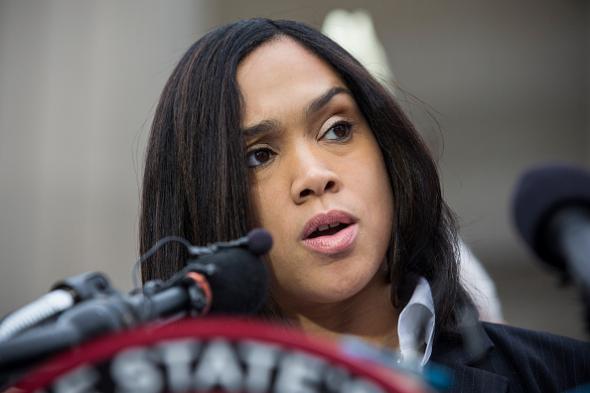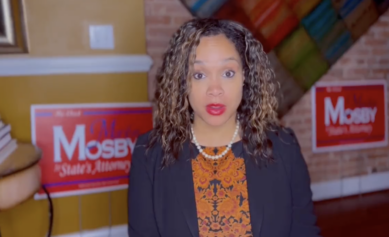Baltimore State’s Attorney Marilyn Mosby announced Tuesday that her office would no longer prosecute marijuana possession cases, regardless of the quantity or an individual’s criminal history.
In the monumental move, Mosby also called on the courts to vacate convictions in close to 5,000 pot possession cases across the city.

Baltimore State’s Attorney Marilyn Mosby said she believes there is no link between marijuana and violent crimes. (Image courtesy of Getty Images)
“When I ask myself: ‘Is the enforcement and prosecution of marijuana possession making us safer as a city?’ The answer is emphatically ‘no,’” she said during her announcement at the nonprofit Center for Urban Families in West Baltimore.
The state’s attorney, who failed to convict any of the six police officers for the in-custody death of Freddie Gray in 2015, was flanked by her staff, community activists and those in favor of marijuana legalization. However, the city’s law enforcement leaders were nowhere to be found, the Baltimore Sun reported.
No other city officials joined her for the announcement either, but Mayor Catherine Pugh later voiced support for what “Mosby is attempting to address, namely the unnecessary criminalization of those who possess marijuana merely for personal use.”
Still, Pugh argued, “we also need to understand that those who deal illegal substances fuel criminality in our neighborhoods which leads to violence.”
Mosby’s actions follow those of district attorneys in Manhattan and Philadelphia who’ve curbed or ceased prosecuting marijuana cases altogether. In Maryland, state lawmakers decriminalized the possession of pot, so long as it’s under 10 grams, back in 2014.
A report released by Mosby’s office on Thursday titled “Reforming a Broken City” shows city prosecutors have dismissed 1,001 marijuana possession cases in Baltimore City Court since 2014. Still, the state’s attorney argued the convictions have left thousands of locals saddled with criminal records.
“I’m 58 years old. I’m in the master’s program,” resident Cyril Scovens told WBAL-TV. “I have my bachelor’s in applied psychology. And every time I go to get a new position in this field, they bring up the marijuana charge.”
Additionally, Mosby said prosecuting marijuana cases aren’t just costly and squander already limited resources, but also disproportionately impact communities of color.
“For far too long, we have sat back and watched certain communities and families destroyed by failed policies of the so-called ‘War on Drugs,'” she said. “The effects of these failed policies have been especially dire for cities like Baltimore, where for decades, we’ve criminalized what is now nationally considered a public health crisis. The statistics are damning when it comes to the disproportionate impact that the war on drugs has had on communities of color.”
Studies show that nationwide, Black Americans are four times more likely than whites to be arrested for pot possession, despite the fact that both groups use the drug at comparable rates. The ratio is even higher in Baltimore, where the city’s Black residents are almost six times more likely to be arrested over the drug, according to the prosecutor’s office report.
Mosby has called on the city’s police community to join her in support of the new effort, but her action has put her at odds with leaders of BPD. Interim Baltimore Police Commissioner Gary Tuggle said he doesn’t agree with the new policy and will continue to have his officers arrest people for marijuana possession.
“Obviously, it’s the state’s attorney’s prerogative to do that,” Tuggle told WBAL-TV. “I’m not going to order our officers not to make those arrests. We see the impact — the negative impact — that marijuana has in our communities. At the end of the day, the last thing that we need in Baltimore is another illegal substance, and I think that until the Legislature decides to change the law, we’re going to continue to enforce it.”
Tuggle believes there’s a link between marijuana and violent crimes, but Mosby doesn’t see it that way.
“There is no public-safety value in prosecuting marijuana possession,” she said. “Furthermore, there is no link between marijuana and violent crime as is illustrated by more than half the states across this nation that have now legalized marijuana.”
Mosby has promised to continue prosecuting persons suspected of selling marijuana and said she plans to hand off cases involving fentanyl to the federal court, where penalties are a bit harsher.
Watch more in the video below.


